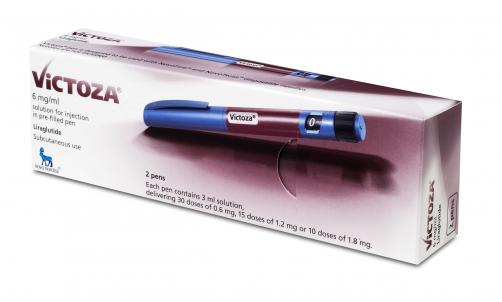
Victoza data shows promise for early setting
pharmafile | September 13, 2011 | News story | Research and Development, Sales and Marketing | Novo Nordisk, Victoza
New data for Novo Nordisk’s Victoza could help the drug’s chances of being used in an earlier setting for type II diabetics.
A study presented at today’s European Association for the Study of Diabetes (EASD) meeting shows a large number of patients met their target for blood sugar control when Victoza (liraglutide) was given early.
Findings showed 72% of patients treated early (who did not receive any prior treatment, or previously had only one oral anti-diabetic drug) with Victoza 1.8mg achieved an HbA1c target of less than 7%, compared with those treated later (49 per cent).
The data also suggested early use with Victoza provides greater clinical benefit and potential improvement in beta-cell function (which stimulates natural insulin release), compared with Victoza in its current licence setting.
Victoza is currently licensed to help lower the blood sugar levels of type II diabetics in combination with current oral anti-diabetics metformin and sulphonylurea, or glitazones such as Takeda’s Actos.
Victoza is a once-daily injectable GLP-1 analogue and is designed to stave off the need for patients to inject multiple daily rounds of insulin after they have failed to control their blood sugar levels on oral anti-diabetics.
But Novo Nordisk is hoping to gain a new licence to treat patients before they fail on these drugs, and the new data could help convince regulators of its efficacy in this setting.
Professor David Matthews of the University of Oxford said: “These results are encouraging as they demonstrate that Victoza can be used in all stages of the disease process.
“In particular, patients who were administered Victoza early following no previous treatment or only one oral anti-diabetic, showed a greater improvement in beta-cell function and more patients achieved target glycaemic control.”
Sales of Victoza have grown strongly, quadrupling in the last quarter to 1.25 kroner ($229 million) despite concerns over an increased risk of pancreatitis.
Its main current rival is Lilly/Amylin’s injectable drug Byetta (exenatide), which works by mimicking the glucose-lowering effects of human hormones, but must be injected twice a day, rather than just once with Novo’s drug.
Ben Adams
Related Content

CHMP recommends Novo Nordisk’s Awiqli for diabetes treatment
Novo Nordisk has announced that the European Medicines Agency’s (EMA) Committee for Medicinal Products for …

Almirall licenses Novo Nordisk’s anti-IL-21 monoclonal antibody for dermatology treatment
Almirall has announced that it has entered into an exclusive license agreement with Novo Nordisk …

Novo Nordisk shares positive results from COMBINE 3 phase 3a trial
Novo Nordisk has shared topline results from the COMBINE 3 phase 3a trial of once-weeklly …








